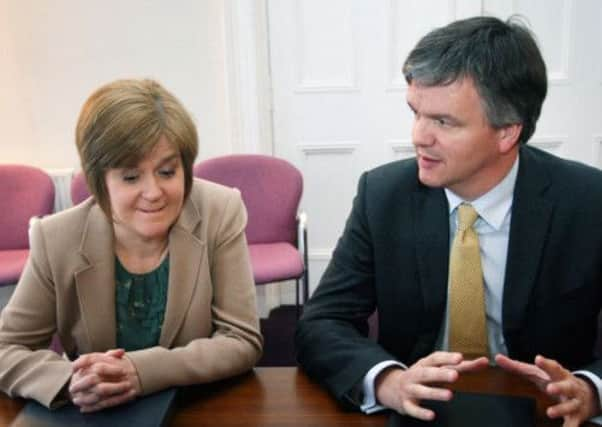Scottish independence: ‘Britishness’ key factor


FROM OUR COLUMNISTS:
The paper by researchers studying the Scottish Social Attitudes Survey (SAS) concludes that economic wellbeing and people’s sense of British identity are the keys to delivering a swing in favour of independence next year.
Advertisement
Hide AdAdvertisement
Hide AdDeputy First Minister Nicola Sturgeon claimed this week that victory would be achieved it she could persuade voters that independence would make the country wealthier and fairer.
The new paper agrees economic issues are of pre-eminent importance. But it also says that, particularly among older people, a sense of British identity is a key factor stopping people from backing independence.
It concludes, therefore, that the Yes camp has to persuade people “not only to leave aside their feelings of Britishness, but also that the British Union is no longer capable of delivering”.
The new paper, which is based on extensive interviews with Scottish residents, examines why people are supporting or opposing independence a year and a half before referendum day next year.
How “Scottish” people feel makes “remarkably little difference”, the survey finds. This is because a sense of Scottish identity “is a near ubiquitous attachment that unites rather than divides most people in Scotland”.
Of far more relevance, it finds, is how “British” people feel. Among those with very little sense of British identity, 53 per cent said they would back independence, compared with only 9 per cent of those who felt they had a strong sense of British identity.
The report concludes that this sense of “British identity” explains the disproportionately large numbers of older people who oppose independence. More than half of people over 65, it found, said they felt a strong British attachment.
The report’s author, John Curtice, professor of politics at Strathclyde University, said: “They do indeed seem to be still carrying the outlook and sympathies of a more unionist age.”
Advertisement
Hide AdAdvertisement
Hide AdHowever, other groups of voters – such as those in professional and managerial occupations – are more likely to be influenced by economic issues than by their sense of British identity.
Prof Curtice concluded: “So far as identity is concerned, it is the degree to which people in Scotland still share some sense of fellow feeling with those living elsewhere in the UK that seems to be central to the choice they are inclined to make.”
He adds: “At the same time, the argument is not just about identity. People’s views also reflect their perceptions and expectations of the economic implications of different constitutional options.”
The paper comes after Deputy First Minister Nicola Sturgeon argued this week that there was a “natural majority” in Scotland for independence.
She claimed that “people will vote Yes if we can persuade them that it opens the door to a wealthier and fairer country.”
A YouGov poll commissioned by the SNP found that 35 per cent of people questioned said they were “more likely” to vote for independence if they agreed that Scotland would become fairer and wealthier after independence.
However, 43 per cent of people said they would vote No regardless, the poll also found.
The 2012 SSA interviewed a sample of 1,229 adults aged 18-plus between July and November 2012.
Sturgeon and Moore go head to head in first TV debate
Advertisement
Hide AdAdvertisement
Hide AdThe first of a series of televised debates ahead of the independence referendum will take place this evening.
Deputy First Minister Nicola Sturgeon and Scottish Secretary Michael Moore will go head to head on Scotland Tonight Referendum Special (10.30pm) focusing on the economics of the issue.
Voters have indicated that the financial implications of Scottish independence are their most important consideration.
More TV debates are planned prior to the 18 September poll next year, although it is not yet clear whether either First Minister Alex Salmond or leader of the Better Together campaign Alistair Darling will be involved.
Mr Salmond has said he wants a debate with Prime Minister David Cameron.
However, the Better Together campaign says Mr Darling should be his opponent, as the leading Scottish figure opposing independence.
Both sides are aware that the TV debates could hold a major sway over the campaign, after they were used for the first time in the general election in 2010.
However, many viewers in the Borders are not likely to be able to watch the first debate this evening, as the regional Borders TV broadcaster is not screening it.
Advertisement
Hide AdAdvertisement
Hide AdMidlothian, South Tweeddale and Lauderdale MP Christine Grahame said: “It is ridiculous that people in Penicuik will be able to watch the debate as it is broadcast, but those living in Melrose may have to wait several hours before being able to hear it online.”
Ms Grahame added: “At present, some of my constituents are being denied the opportunity to hear this debate on what is fundamentally very important to the future of our country.”
SEE ALSO: